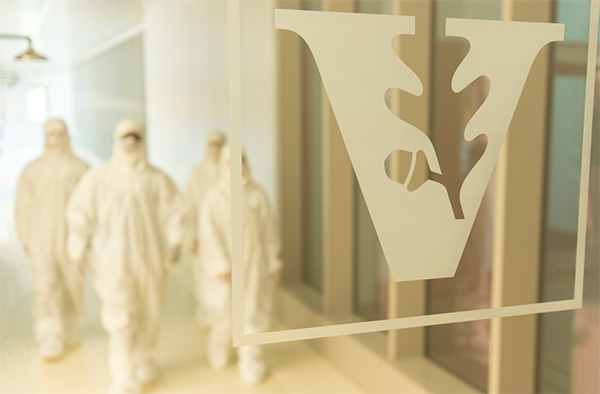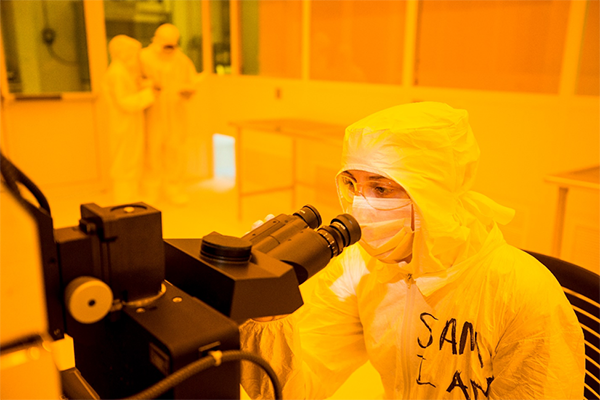Home » News » Undergraduate Immersion in Nanotechnology: Working in the VINSE Cleanroom
Undergraduate Immersion in Nanotechnology: Working in the VINSE Cleanroom
Posted by anderc8 on Tuesday, February 27, 2018 in News, TIPs 2016.
Written by Alice Leach, Research Assistant Professor and Cleanroom Immersion Leader (Vanderbilt Institute of Nanoscale Science & Engineering)
If you have taken a stroll over to Vanderbilt’s new Engineering and Science Building on the west side of campus, you may have seen a rather strange sight. On the ground floor, behind impressive floor-to-ceiling windows, are people dressed head-to-toe in white, operating a range of high tech equipment. These people are not in a scientific cult or trying to start a questionable fashion trend, but rather they are dressed appropriately to work in the new, state-of-the-art Vanderbilt Institute of Nanoscale Science and Engineering (VINSE) cleanroom. A cleanroom is a controlled environment with a low level of pollutants such as dust, airborne microbes and chemical vapors. The biggest source of such contaminants in the cleanroom is actually the cleanroom users themselves, so they cover themselves in clean garments to prevent oil, salt and particulates on their bodies from entering the lab environment.

Users inside the new VINSE cleanroom.
The research done by VINSE focuses on nanoscale devices and materials. Nano-objects are much less than one millionth of a meter in size, hundreds of times smaller than a particle of dust, so fabrication of nano-materials and nano-devices frequently must be performed in a dust-free environment like the cleanroom. Cleanroom laboratories, however, are not found exclusively in the realm of research. In fact, they have become of fundamental importance to the modern world. The most common example of this is in electronics. As the component parts of cell phones and computers become smaller and smaller, the probability of contamination by dust becomes higher. A single particle of dust can destroy hundreds of components on a modern microchip. As such, cleanrooms are ubiquitous across a range of fabrication industries, including pharmaceutical, automotive and aerospace. However, due to the sensitivity of the work done inside, and the high cost of running these facilities, very few undergraduate students have access to the processes carried out inside these cleanrooms. Fortunately, with support from a Vanderbilt-sponsored Trans-Institutional Programs (TIPs) award, the VINSE cleanroom has opened its doors to undergraduate and graduate courses. By making our cutting-edge nanoscience facilities accessible, VINSE enables students to develop a deeper understanding of the science behind most modern technologies and can train the next generation of highly-skilled scientists and engineers.

Undergraduate Samantha Kaczaral uses the mask aligner inside the VINSE cleanroom.
Last fall, TIPs funding allowed the VINSE cleanroom to support laboratories for four courses, covering a broad range of topics spanning traditional semiconductor materials processing to cutting edge synthesis of two-dimensional materials. As Cleanroom Immersion Leader, I work with the faculty member teaching the lecture portion of the course to ensure the labs are complementary to the classroom content and to design activities that give students hands-on experience with state-of-the-art instruments. I am also lucky enough to have a pretty unique set of educational tools at my disposal, so I teach not only the operation of cleanroom instrumentation but also methods of problem solving key to success in research and development. For example, in some laboratories, each student runs a process with a different set of instrument parameters. The data is then shared and students identify the optimal parameters for the process. This approach emphasizes the importance of teamwork and allows students to experience the methodology used in process development, an important technique used in both research and industry. In another lab, a plasma enhanced chemical vapor deposition tool is dismantled, giving students rare insight into the plumbing and electronics behind an advanced instrument.
With the support of TIPs, the VINSE staff, and the students involved, last semester was a great success. One student commented: “I usually don’t think labs do a great job of helping me understand the material, but this class definitely helped and I got very practical experience”
If you have any questions about VINSE, the Nanoscience and Nanotechnology minor, our courses, research or facilities please let us know in the space below, check out our website or email us at vinse@vanderbilt.edu.
